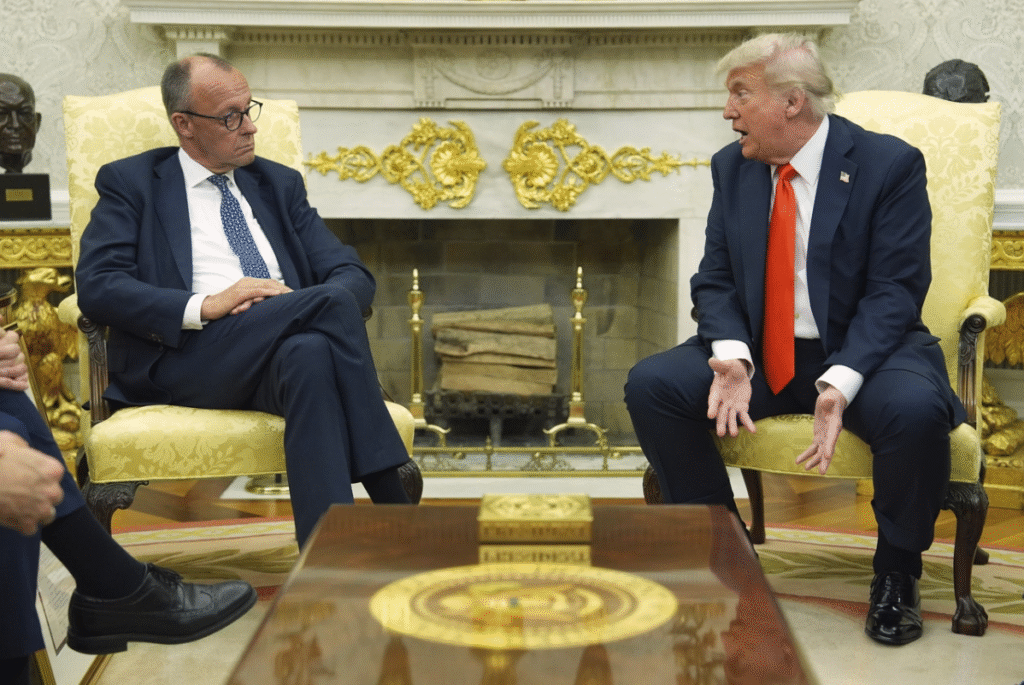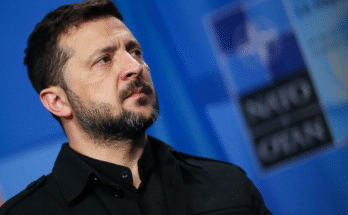Five days after securing his election victory in February 2025, Friedrich Merz, Germany’s incoming Chancellor and leader of the Christian Democratic Union, experienced what he would later describe as his world collapsing. On February 28, 2025, after being hailed as “the future federal chancellor” at a rally in Hamburg, Merz received a message from his spokesperson urging him to watch a video.

The video, set in the familiar Oval Office of the White House, showed a tired and helpless Ukrainian President Volodymyr Zelenskyy being publicly humiliated by U.S. President Donald Trump. Trump accused Zelenskyy of endangering millions of lives and risking a third world war, scolding him like a “naughty child” for several minutes. Vice President JD Vance repeatedly questioned Zelenskyy, “Did you ever say thank you?” The meeting ended abruptly, with subsequent talks and a celebratory lunch canceled, and Zelenskyy simply dismissed.
Merz, who held Zelenskyy in high esteem and had recently accepted his congratulations on the election, was dismayed. Ukraine had high hopes for Merz, expecting him to finally provide the German Taurus cruise missile, which his predecessor, Olaf Scholz, had refused.
Immediately after watching the nearly 40-minute scene, Merz posted a solidarity message to Zelenskyy on X: “We must never confuse the aggressor with the victim in this war!” He then spent half the night on the phone, including with outgoing Chancellor Scholz.
Both Merz and Scholz agreed that a historic shift had occurred in Washington. They believed the U.S. was threatening to abandon not just Ukraine but all its allies, casting serious doubt on Article 5 of the NATO Treaty and the credibility of American nuclear deterrence. This alarming assessment led them to concur that Germany must embark on a massive and rapid rearmament, costing between 1 and 1.5 trillion euros over the next 12 years—double previous defense spending.
This newfound urgency directly contradicted Merz’s pre-election campaign to maintain Germany’s “debt brake,” a constitutional fiscal rule limiting new government debt. However, the humiliation of Zelenskyy changed everything for Merz, who would soon reverse his stance on borrowing.
Merz’s doubts about his prior convictions had been growing. Weeks earlier, he met with Vice President Vance in Munich, attempting to dissuade him from publicly endorsing Germany’s far-right AfD party. Despite Vance’s apparent agreement, he later stunned the Munich Security Conference by advocating for the inclusion of right-wing populists in European politics, a move seen as a veiled endorsement of the AfD. It was later revealed Vance had met with AfD leader Alice Weidel without informing Merz.
Following this, Merz privately began considering the need for Germany to take on additional debt. He publicly hinted at a “fundamental shift in the global political landscape” after Trump’s statements. Discreetly, he sought legal advice on amending Germany’s Basic Law to allow for more debt, a move requiring a two-thirds parliamentary majority. Such a majority was possible with the outgoing Bundestag but unlikely with the newly elected, more fragmented parliament set to convene on March 25.
On election night, Merz gave a public signal of his changing views on the Berliner Runde, stating his “absolute priority to strengthen Europe as quickly as possible so that, step by step, we can really achieve independence from the USA.” This remark astonished Scholz, as German politicians had traditionally avoided such suggestions. Merz explained that Trump’s recent statements indicated the U.S. administration’s indifference to Europe’s fate, raising questions about NATO’s future and the need for independent European defense.
The election results showed Merz’s Christian Democrats gained votes but failed to secure a two-thirds majority in parliament alongside other centrist parties. This meant they could not elect Constitutional Court judges, declare war, or amend the Basic Law, including the debt brake. This situation drew comparisons to the Weimar Republic, where a fragmented Reichstag fueled frustration with democracy.
In private meetings with Scholz after the election, Merz was presented with intelligence on Russia’s immense arms buildup, suggesting Putin was preparing for another war against Europe. Scholz, despite campaigning as a peace chancellor, advised massive rearmament.
Germany’s new coalition government, comprising Merz’s Christian Democrats and Scholz’s Social Democrats, rapidly negotiated a spending plan before the March 25 deadline. On March 4, they announced a deal for a defense buildup five times larger than Scholz’s previous increase, along with an additional 500 billion euros for infrastructure.
Merz justified this unprecedented debt by quoting former European Central Bank head Mario Draghi: “In view of the threats to our freedom and peace on our continent, the same must now apply to our defense: Whatever it takes!” He further shocked MPs by suggesting that if Trump announced a NATO withdrawal that night (referring to Trump’s upcoming speech to Congress), Germany would be the first to have “reacted correctly in advance.”
Merz later confided to allies that he had received information from an American source that Trump would use his speech to announce a U.S. withdrawal from NATO. This source had previously provided accurate advance information on Vance’s Munich speech. Merz believed a NATO withdrawal could trigger an immediate Russian attack on the Baltic states. His decision to support the trillion-euro debt was made under this dramatic belief in an imminent new European war and NATO’s potential collapse.
However, things unfolded differently: Trump delivered his congressional speech without mentioning a NATO withdrawal. To this day, Merz believes Trump changed his mind at the last minute, and the White House stated such an announcement was “never included in any draft of any speech.”


